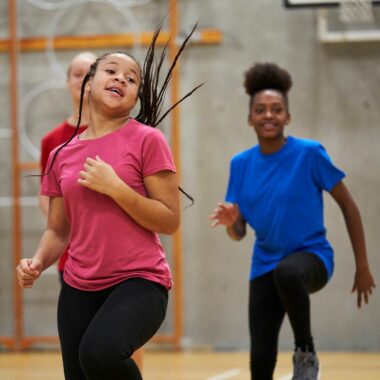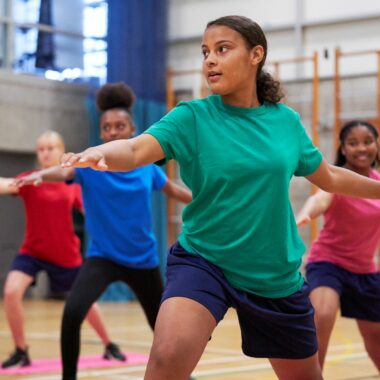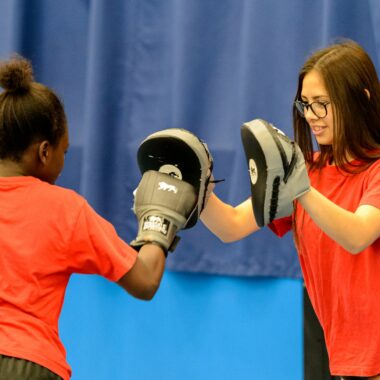Supporting Young People’s Mental Health with Physical Activity
Project Overview
Sport England’s Active Lives Children’s and Young people survey shows that there is a positive association between being active and improved mental wellbeing. Children who are more active are happier, have reduced depressive symptoms and behavioural and emotional difficulties (Booth et al, 2023).
Active Kent & Medway has been working with a number of schools who were keen to deliver mental wellbeing pilot projects using physical activity sessions to support young people’s mental health. Sessions were delivered to small groups to enable dedicated support. They took place before or after school or during lunch breaks.
Sessions included…

Girls judo club
Mental health breakfast clubs
Sensory circuits
Girls yoga club
Kick boxing
Marching Music
Since attending the sessions…

83% said they have felt happier
57% said they now sleep better
55% have enjoyed being at school
52% agree they now know how to deal with their emotions
57% now feel able to cope when things go wrong
67% find it easier to concentrate
We asked students how much physical activity they did before and after the sessions...
0-29 minutes per day
30-59 minutes per day
60 minutes per day
We asked students how they felt after being active…

“More motivated and willing to do things even when I don’t have the energy for it”
“A bit more happy than I have been in a while”
“Proud, happy and relaxed”
“Happier at school and can think more easily”
“Fit and well for the day ahead”
"More focused and have more energy"
Recommendations
Keep groups small: Run smaller group sessions with students of similar ability. This allows them to build up confidence, create trusted relationships with staff and students and provides them with a support group where they can be themselves.
Make it fun: Enjoyment is key to creating positive experiences for young people. Make sure the sessions are fun and engaging. Ask students what they enjoy and build upon these in the sessions.
Co-create activities: Work with students to ensure their needs are reflected in the sessions. Co-creation elevates students experiences, makes them feel valued and gives them the ability to shape their own experiences and experiences of others.
A School's Story
 Active Kent & Medway visited The Victory Academy in Medway to find out more about their Yoga Club targeting girls who were identified as needing further support around their mental health and wellbeing.
Active Kent & Medway visited The Victory Academy in Medway to find out more about their Yoga Club targeting girls who were identified as needing further support around their mental health and wellbeing.
Please can you tell us a bit about your project?
I was able to secure a Yoga instructor who ran a course which covered not just Yoga but also meditation and breathing skills, which can be used both inside and outside of school. Students were selected from different year groups. All were known to struggle with anxiety/worry/stress and have challenging behaviours.
How have you engaged with the least active students?
The group were very diverse, which allowed for students who would never normally come together, work very closely in their Yoga sessions. They encouraged and supported each other.
How have you consulted with students to ensure they have a say in how sessions are run?
At the end of the sessions all students would discuss with me what they enjoyed and what they didn’t. This allowed me to feedback to the instructor to shape how the next session would run by either including or excluding certain elements.
How have you made sure opportunities will continue?
We’ve encouraged students to get involved with activities that the school offers, and summer projects via Medway Council. We actively advertise school activities and any local groups so students can see what is available to them.
Have there been any challenges, if so, how have you overcome them?
For some students they would never have the opportunity to take Yoga classes so their views and opinions were quite negative when first approached. It was only after taking the classes and feeling the benefits did I see their opinions change and become positive ones.
Any advice you can give other teachers looking to run similar projects?
Be confident in what you are offering. I knew that if the students were open minded enough, Yoga would benefit them. I saw for myself students using the breathing techniques when dealing with panic attacks/exam stress. Once students saw for themselves that they were benefiting and enjoying the sessions, they became more active and more willing to partake.
Additional Resources

Sport England recently published a new report that shows there is “strong and consistent evidence that sport and physical activity interventions had positive effects on the diagnosed mental health problems of children and young people”.
The ‘Children and Young People’s Mental Health and Physical Activity’ report has been produced by Edge Hill University. Previous research has shown the positive impact of being active on children’s general wellbeing, but there had been little documented evidence on the role of sport and physical activity in the treatment of diagnosed mental health conditions in children and young people.
Edge Hill collated and reviewed existing research from across 143 studies to assess the strength of evidence. A consistent picture emerged of the effectiveness of different types of exercise in treating and managing young people’s mental health conditions.
If you have any questions or would like to deliver a mental wellbeing pilot project in your school, please contact Daniel Bromley, Children and Young People Development Officer at daniel.bromley@kent.gov.uk

